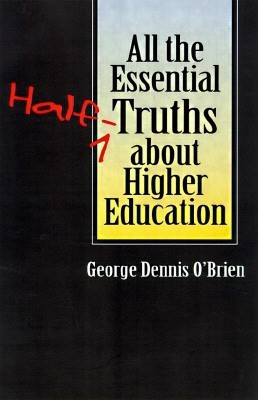All the Essential Half-truths About Higher Education(English, Hardcover, O'Brien George)
Quick Overview
Product Price Comparison
This is a cogent analysis of higher education institutions in America. In this exploration, George Dennis O'Brien argues that to debate intelligently about the future of education, it is necessary to stop focusing on its ideals and look instead at its institutions. He shows how the institution of American higher education has changed fundamentally during the 20th century when the administration-led, religious or denominational college was replaced by the faculty-dominated research university. Since then, the scientific assumptions of the research model have clashed with what O'Brien terms the "historical hangover of moral mission", still expected of the university. How will ambiguously-governed institutions respond intelligently to the financial, technological and cultural changes now just beginning to affect higher education? Who will decide, for example, how many physicists are enough, or which departments should be shut down? This text seeks to illuminate such issues by looking at them in their institutional setting. Valid goals and ideas are significantly altered once they are incorporated into practical form: what may have been "truths" become "half-truths."The idea of "academic freedom" becomes institutionalized as academic tenure; a "well-rounded" or liberal arts education becomes a distribution requirement. In each chapter, the author addresses one of nine half-truths, such as whether "low-cost public education benefits the least-advantaged in society", and goes on to provocatively explore how accurately it reflects the true state of higher education. O'Brien's proposals for the 21st century range from changing the nature of tenure to rethinking the logic of financial aid, and to the development of distinctive institutional missions. He presents a closely-argued account of the present challenges and future prospects of American higher education.


